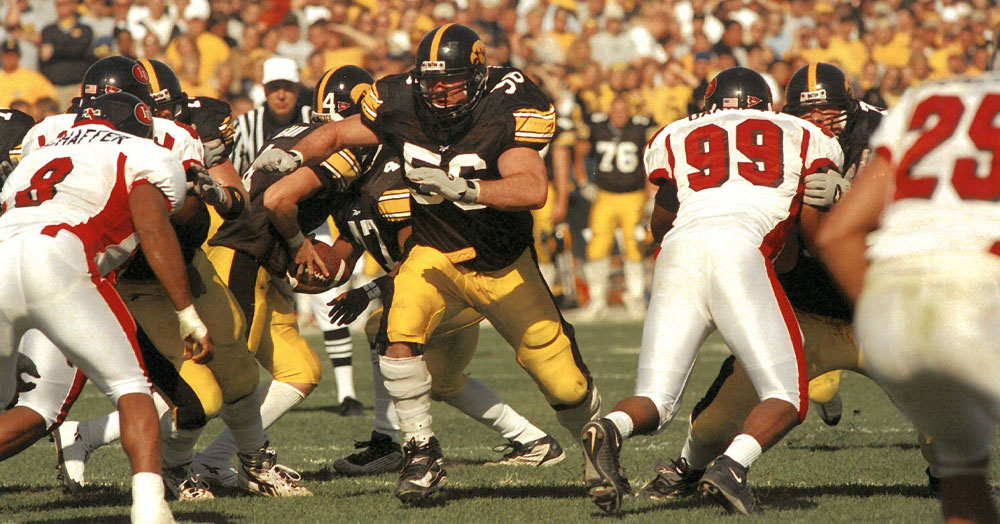Iowa Athletics Hall of Fame
Eric Steinbach (03BS)
Full circle.
Iowa football coach Kirk Ferentz was on the Zoom conference call to tell Eric Steinbach, one of his former offensive linemen, that he was going to be one of the 2023 inductees into the UI Athletics Hall of Fame.
It brought Steinbach back to when he was on Ferentz’s first teams, the building blocks for the current program.
“It’s very special,” Steinbach says. “When I got the surprise Zoom call from Kirk, I was shocked. I wasn’t expecting it, didn’t know it was coming.
“It was kind of a full-circle kind of moment.”
Steinbach was recruited by former Iowa coach Hayden Fry but played for four seasons under Ferentz. There was a yearly progression of success—one win in 1999, three in 2000, seven and an Alamo Bowl bid in 2001, and then the 11-2 season of 2002 when the Hawkeyes shared the Big Ten regular-season championship and played in the Orange Bowl.
“It’s pretty rewarding, looking back, knowing my class was the start of it,” Steinbach says. “When Kirk came in, we were young pups. And he was new at it, too—it was his first year as a head coach. To look back, to see the growth—you could see it in those four years. We worked really hard and it paid off for all of us—Kirk and his coaching staff, and us players.”
Iowa’s only regular-season loss in that 2002 season was at Iowa State. The Hawkeyes went 8-0 in Big Ten play, tying Ohio State for the title. Iowa was rewarded with a spot in the Orange Bowl, a game that was part of the Bowl Championship Series, where the Hawkeyes lost to USC.
“The goal was always to get to the Rose Bowl, but a BCS bowl was just as good,” Steinbach says.
Steinbach was a consensus first-team All-American in 2002, as well as the Big Ten’s offensive lineman of the year. He was the left guard on an offensive line that allowed only 12 sacks, leading the Big Ten.

PHOTO: HAWKEYESPORTS.COM
Steinbach was selected in the second round of the 2003 NFL draft by the Cincinnati Bengals.
“Playing at Iowa was an awesome experience, and it was kind of a stepping stone to help me fulfill my dream,” Steinbach says. “When I was a little kid, it was always about the NFL and how I could get there. Having a great career at Iowa helped me get to the NFL.”
Steinbach played four seasons with the Bengals, followed by four with the Cleveland Browns. He tried to come back from injuries to play in 2012 with the Miami Dolphins, but retired before the season started.
“I was pretty beat up at that point,” Steinbach says. “My knees were basically bone on bone. I was just a step and a half slower than everyone else.”
The Dolphins’ coach at the time was Joe Philbin, who had been Steinbach’s offensive line coach at Iowa.
Full circle, Steinbach says.
“Coach Philbin tried to give me one more shot, and I appreciate that,” Steinbach says.
Steinbach lives in Lake Bluff, Ill. He coaches his five sons as they play football and lacrosse.
“It’s kind of a sleepy lake town,” he says. “I’m loving life.”
—JOHN BOHNENKAMP
